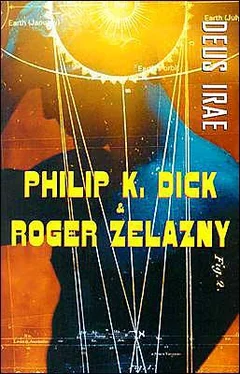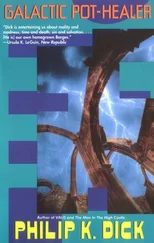I am all of us.
He continued to stare at the eyes located about twenty-five feet from him.
I know now how you hear me. There is pain, pain in you. This, somehow, lets you hear.
“There are pieces of metal in my head,” he said, “from when my office exploded. I do not understand this thing either, but I can see how it may be involved.”
Yes. In fact, I see that one of the pieces nearer the surface will soon work its way free. Then you must break your skin with your claws and withdraw it.
“I don’t have claws—oh, my fingernails. Then that must be what’s causing these headaches. Another piece is moving around. Fortunately, I can use my knife. That time I had to claw one out was pretty bad.”
What is a knife?
(Steel, sharp, gleaming, with a handle.)
Where does one get a knife?
“One has one, finds one, buys one, steals one, or makes one.”
I do not have one, but I have found yours. I do not know how to buy or steal or make one. So I will take yours.
And more opallike sparkles occurred, and more, and more, and slowly they drifted forward, and he knew that his gun was worthless.
There came a terrible pain within his head and white flashes destroying his seeing. When it cleared, there were thousands of rats all about him and he moved without thinking.
He pulled the bulb from his ammo belt, withdrew the pin, and hurled the bulb into their midst.
For three pulsebeats nothing happened, except that they continued their advance.
Then there came a blinding solar-corona blaze, which did not diminish but persisted for many minutes. White phosphorus. He followed it with napalm. He chuckled as they burned and screamed and clawed at one another. At least, something within him was chuckling, some part of him. The rats fell back and there came another pain within his head. There was an especially violent throbbing in the vicinity of his left temple.
Do not do that again, please. I did not realize You to be such a thing as You are.
“I damned well will do it, if you try what you tried again.”
I will not. I will bring forth of rats for You to eat. Of the young, fat ones. Only deliver us from Your wrath.
“Very well.”
How many of rats do You desire?
“Six should do it.”
They will be of the very best and plumpest.
They were brought before him, and he beheaded them, cleaned them, and roasted them over the sterno stove he carried in his pack.
Would You care for more of rats? I can give You all that You desire.
“No, I need no more,” he said.
Are You certain? Perhaps six more?
“These have been sufficient, for now,” he said.
You will remain until the storm stops?
“Yes,” he said.
Then You will go away?
“Yes,” he said.
Come back to me one day, please. I will always have more rats for You to eat, I wish to have You come back.
… And deliver us from Your wrath, oh thing You name in Your pain as Carl Lufteufel.
“Perhaps,” he said, smiling.
Aboard his cart, Tibor McMasters rode in style, with a flourish; pulled by the faithful cow, the cart rattled and bounced on, and miles of weedy pasture passed by, flat country with stalks rising, both tough and dry: this had become arid land, not fit for crops any longer. As he rolled forward, Tibor exulted; he had finally begun his Pilg and it would be a success; he knew it would.
He did not especially fear cutpurses and highwaymen, partly because no one bothered with the highways… he could rationalize this fear away, telling himself that since no traffic passed this way, how could there be highwaymen?
“O friends!” he declared aloud, translating into English the opening words of Schiller’s An die Freunde. “Not these tones! On the contrary, let us sing of—” He paused, having forgotten the rest. God damn it, he said fiercely to himself, baffled by the tricks of his own mind.
The sun blazed down, hot as minnows skimming in the metallic surf, the tidal rise and fall of reality. He coughed, spat, and continued on.
Over everything, the sensual proximity of decay. Even the wild weeds possessed it, this abandonment. No one cared; no one did anything. O Freunde, he thought. Nicht diese Tone. Sondern…
What if there were highwaymen invisible now, due to mutation? No; impossible. He clung to that. Noted, preserved, and maintained that. He did not have to fear men: only the wilderness threatened him. In particular he feared the real possibility of a rupture in the road. A few wide ruts and his cart would not travel on. He could well die amid boulders. Not the best death, he reflected. And yet, not one of the worst.
The broken limbs of trees blocked the road ahead. He slowed down, squinted in the patterned sunlight, trying to make out what it was.
Trees, he decided. Felled at the start of the war. No one has removed them.
In his cart he coasted up to the first tree. A trail of rough pebbles and dirt led off to one side, skirting the fallen trees; the trail, on the far side, led back to the road. If he had been on foot, or riding a bicycle… but instead he rested on a large cart, much too cumbersome to navigate the trail.
“God damn it,” he said.
He stopped his cart, listened to the dull whistle of wind sighing through the broken trees. No human voices. Somewhere far off, something barked, perhaps a dog, or if not that, then a large bird. Squawk, squawk, the sounds came. He spat over the side of his cart and once more surveyed the trail.
Maybe I can make it, he said to himself.
But suppose his cart got stuck?
Gripping the tiller of the cart, he jogged forward, and rumbled off the weed-cracked road and onto the dirt trail. His wheels spun anxiously, a high-pitched whirring sound, and clouds of brown dust whistled up in a dry geyser into the sky.
The cart had become stuck.
He did not get very far, he realized. But, all at once, he felt savage, almost nauseated, fear. A sour taste rose up within him, and his chest and arms burned red with humiliation. Stuck so soon: it humiliated him. Suppose someone saw him, here, caught in the dirt by the side of the collapsing road? They would jeer, he thought. At me. And go on. But—more likely they would assist me, he thought. I mean, it would be unreasonable to jeer. After all, have I become cynical about mankind? They’d help, of course. And yet his ears still burned with shame. To distract himself from his plight he got out a much-creased, oil-soaked Richfield map, and consulted it with an idea that he might find something of use.
He located himself on the map. Hardly a drop in the bucket, he discovered. I’ve only gone say thirty or thirty-five miles.
And yet this constituted a different world from the one he knew at Charlottesville. Another world only thirty miles away… perhaps one of a thousand dissimilar universes wheeling through sidereal time and space. Here and there on the map: names that once meant something. Now it had become a lunar map, with craters: vast potholes scooped out of the earth, down to bedrock. Almost below the soil level, where basalt flourished.
He flicked his whip at the cow, threw the mode-selector into reverse, and, gritting his teeth, rocked back and forth between forward one and reverse; the cart seethed as if on a wilderness of open sea.
The smell of burning oil, the clouds of dust raised… that was all. He groaned, and let up on the throttle. And here am I going to die, a part of his brain declared, and, instantly, he jeered—jeered at himself and his broken plight. He did not need anyone else; he could heap ridicule on himself single-handedly.
Читать дальше








